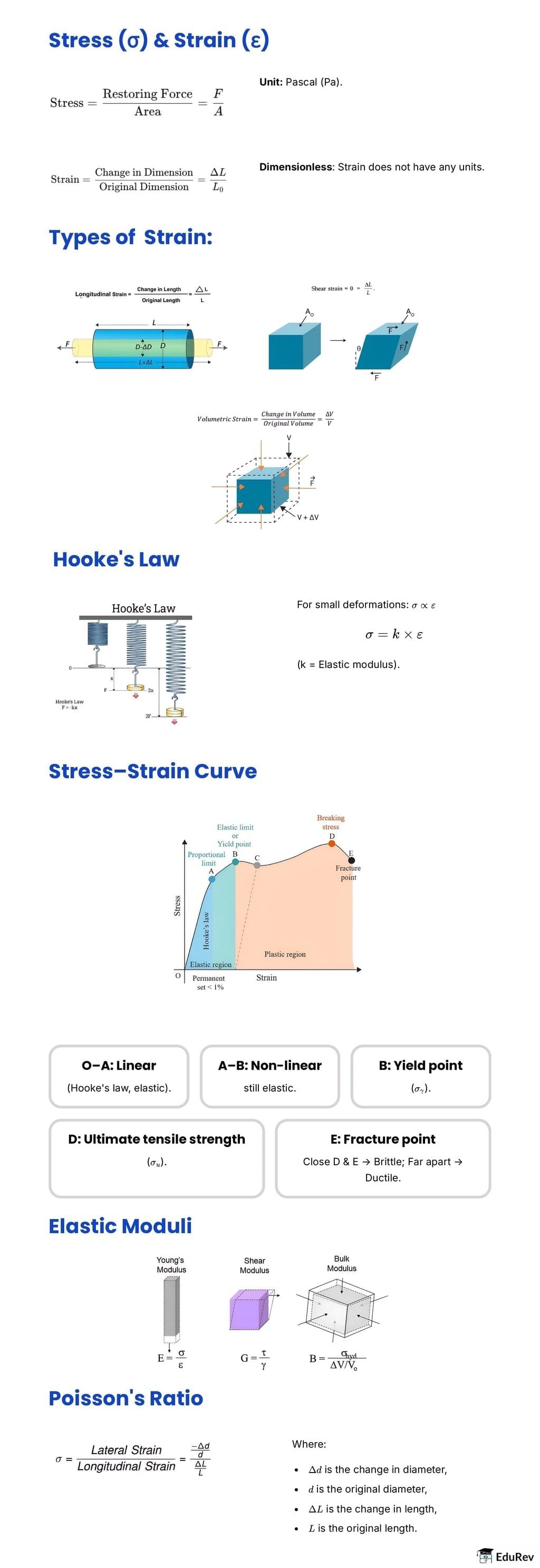JEE Exam > JEE Notes > Physics for JEE Main & Advanced > Infographic: Mechanical Properties of Solids
Infographic: Mechanical Properties of Solids | Physics for JEE Main & Advanced PDF Download

The document Infographic: Mechanical Properties of Solids | Physics for JEE Main & Advanced is a part of the JEE Course Physics for JEE Main & Advanced.
All you need of JEE at this link: JEE
|
320 videos|1028 docs|210 tests
|
FAQs on Infographic: Mechanical Properties of Solids - Physics for JEE Main & Advanced
| 1. What are the key mechanical properties of solids that are important for JEE preparation? |  |
Ans. The key mechanical properties of solids include tensile strength, compressive strength, shear strength, elasticity, plasticity, ductility, brittleness, hardness, toughness, and resilience. These properties are crucial for understanding how materials behave under various forces, which is essential for solving problems related to mechanics in the JEE exam.
| 2. How does elasticity differ from plasticity in solids? |  |
Ans. Elasticity is the ability of a material to return to its original shape after the removal of stress, while plasticity refers to the capacity of a material to undergo permanent deformation without rupture when subjected to stress. Understanding this difference is vital for analyzing material behavior under different loading conditions.
| 3. What is the significance of Young's modulus in the study of mechanical properties of solids? |  |
Ans. Young's modulus is a measure of the stiffness of a solid material and is defined as the ratio of tensile stress to tensile strain in the elastic region of the stress-strain curve. It is significant because it helps predict how much a material will deform under a given load, which is essential for engineering applications and JEE questions related to material mechanics.
| 4. Can you explain the concept of toughness and its relevance in engineering applications? |  |
Ans. Toughness is the ability of a material to absorb energy and plastically deform without fracturing. It is a crucial property in engineering applications where materials are subjected to impact or sudden forces, as it indicates how well a material can withstand such conditions without failing. In JEE, questions may involve analyzing materials based on toughness ratings.
| 5. What role does hardness play in the mechanical properties of materials, and how is it measured? |  |
Ans. Hardness is the resistance of a material to deformation, particularly permanent deformation, indentation, or scratching. It is an important property in applications where wear resistance is crucial. Hardness is typically measured using various scales, such as the Mohs scale, Brinell hardness test, or Rockwell hardness test. Understanding hardness helps in selecting appropriate materials for specific applications in engineering problems presented in the JEE exam.
Related Searches
















